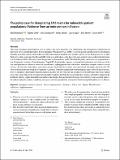The policy case for designating EMS teams for vulnerable patient populations: Evidence from an intervention in Boston
Author(s)
Brennan, Mark; Dyer, Sophia; Jonasson, Jonas; Salvia, James; Segal, Laura; Serino, Erin; Steil, Justin; ... Show more Show less
Download10729_2023_Article_9635.pdf (2.795Mb)
Publisher with Creative Commons License
Publisher with Creative Commons License
Creative Commons Attribution
Terms of use
Metadata
Show full item recordAbstract
Abstract
This study documents more than five years of analysis that drove the policy case, deployment, and retrospective evaluation for an innovative service model that enables Boston Emergency Medical Services (EMS) to respond quickly and effectively to investigation incidents in an area of heavy need in Boston. These investigation incidents are typically calls for service from passers-by or other third-party callers requesting that Boston EMS check in on individuals, often those who may appear to have an altered mental status or to be unhoused. First, this study reports the pre-intervention analytics in 2017 that built the policy case for service segmentation, a new Community Assistance Team designated “Squad 80” that primarily responds to investigation incidents in one broad area of the city with high rates of substance abuse and homelessness, helping patients who often refuse ambulance transport connect to social services. Second, this study reports a post-intervention, observational evaluation of its operational advantages and trade-offs. We observe that incidents involving the Community Assistance Team have significantly shorter response times and result in fewer transports to emergency departments than investigation incidents not involving the unit, leading to fewer ambulance unit-hours utilized across the system. This study documents the descriptive analytics that built the successful policy case for a substantive change in the healthcare-delivery supply chain in Boston and how this change offers operational advantages. It is written to be an accessible guide to the analysts and policy makers considering emergency services segmentation, an important frontier in equitable public-service delivery.
Date issued
2023-04-12Department
Massachusetts Institute of Technology. Department of Urban Studies and Planning; Sloan School of ManagementPublisher
Springer US
Citation
Brennan, Mark, Dyer, Sophia, Jonasson, Jonas, Salvia, James, Segal, Laura et al. 2023. "The policy case for designating EMS teams for vulnerable patient populations: Evidence from an intervention in Boston."
Version: Final published version